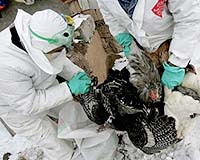| . |  |
. |
London, UK (SPX) Jun 03, 2010 A study published in the journal Nature casts doubt on the widely held notion that warming global temperatures will lead to a future intensification of malaria and an expansion of its global range. The research, conducted by the Malaria Atlas Project (MAP), a multinational team of researchers funded mainly by the Wellcome Trust, suggests that current interventions could have a far more dramatic - and positive - effect on reducing the spread of malaria than any negative effects caused by climate change. A steady stream of modelling studies have predicted that malaria will worsen and its range will spread as the world gets warmer. Malaria already kills more than a million people each year, mainly young children and pregnant women, with some 2.4 billion people at risk from its most deadly form. Last year the Malaria Atlas Project produced a new map of modern-day malaria risk, giving researchers a unique opportunity to examine the effects that climate change may have had on the disease. The new research compared this modern-day map with a historic reconstruction of malaria at its assumed peak, around 1900, and measured changes in the disease risk since that time. Although it is widely known that malaria has receded from many areas where it was previously endemic, such as the United States and much of Europe, the researchers were able to measure for the first time the extent of this recession and show that even in tropical areas the intensity of transmission has declined substantially this century. The research was led by Dr Pete Gething from the Department of Zoology at the University of Oxford. He says: "The recession in malaria since 1900 is of little comfort to the billions of people still at serious risk, but it is important when thinking about the effects of climate on the future of the disease. We know that warming can boost malaria transmission but the major declines we've measured have happened during a century of rising temperatures, so clearly a changing climate doesn't tell the whole story." The team compared the increases in malaria predicted by global warming scenarios with the actual declines of the twentieth century. Importantly, they also gauged the efficacy of different disease control measures when set against the possible adverse effects of rising temperatures and concluded that interventions such as insecticide-treated bed nets or modern antimalarial drugs can potentially outweigh the effects of global warming as much as tenfold. Dr Simon Hay, who leads the MAP group in Oxford, explains: "When we looked at studies measuring the possible impact of bed nets or drugs, it was clear that they could massively reduce transmission and counteract the much smaller effects of rising temperatures. "Malaria remains a huge public health problem and the international community has an unprecedented opportunity to relieve this burden with existing interventions. Any failure in meeting this challenge will be very difficult to attribute to climate change."
Share This Article With Planet Earth
Related Links Wellcome Trust Malaria Atlas Project Epidemics on Earth - Bird Flu, HIV/AIDS, Ebola
 Woman dies in China from bird flu: government
Woman dies in China from bird flu: governmentBeijing (AFP) June 7, 2010 A young pregnant woman has died of bird flu, China's Health Ministry said, the first reported fatality from the virus since early last year. The 22-year-old, who was four months pregnant, contracted the illness in late May and died last Thursday in the central province of Hubei, a notice on the ministry's website said. She was diagnosed with avian influenza (H5N1) a day before dying, it ... read more |
|
| The content herein, unless otherwise known to be public domain, are Copyright 1995-2010 - SpaceDaily. AFP and UPI Wire Stories are copyright Agence France-Presse and United Press International. ESA Portal Reports are copyright European Space Agency. All NASA sourced material is public domain. Additional copyrights may apply in whole or part to other bona fide parties. Advertising does not imply endorsement,agreement or approval of any opinions, statements or information provided by SpaceDaily on any Web page published or hosted by SpaceDaily. Privacy Statement |